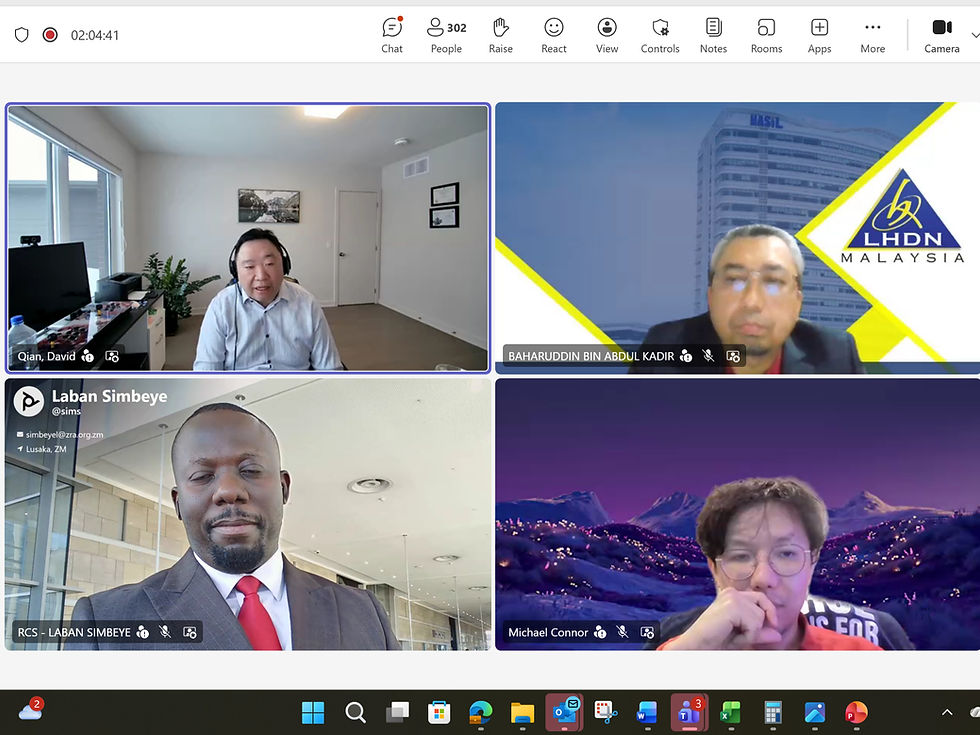Day 2 Working Groups Highlights: 45th CATA Technical Conference, Port Moresby, 9 July 2025
- Jul 11, 2025
- 3 min read
The second day of the Working Group sessions at the 45th CATA Technical Conference provided a platform for in-depth discussions on risk-based audit systems, GST/VAT monitoring systems, and the use of data and innovative technologies to improve tax administration.
Working Group 1 – Session 3: Risk-Based Audits: Balancing Global Standards and Local Priorities
Moderator: Sh Prabodh Yadav, Central Board of Direct Taxes India
This session considered how tax administrations can implement risk-based audit systems that both align with global standards and address local realities.

Participants discussed how effective data analytics and governance and use of AI can assist in identifying high-risk taxpayers.

Key highlights included:
The experience of Uganda in implementing risk-based audits, taking into account local challenges, innovations and lessons learned.
Malaysia’s use of data analytics in risk-based audits, highlighting key success factors and practices that can be replicated across CATA.

The session also identified the importance of key data governance principles for fair and effective audits, and highlighted the value of sharing experiences. Despite CATA’s diverse membership, the session provided participants with a shared understanding of how to implement risk-based audits in their own contexts.
Working Group 1 – Session 4: Developing Local Solutions for Seamless Data Integration
Moderator: Mr Nahshal Mohamed, Maldives Inland Revenue Authority
In this session participants discussed how tax administrations can adopt practical data integration solutions that align with global data-sharing standards. This is an important issue for CATA’s membership which must find ways to translate international norms into their national reality.

Key highlights included:
An overview of global data-sharing standards and data sources from the OECD.
Perspectives from Australia and Lesotho on data collection and integration that meet international standards as well as local needs.
These insights allowed participants to consider how they can overcome technical and regulatory barriers to achieve seamless, real-time data integration in a way that responds to country-specific conditions. The working group produced recommendations for international cooperation, which CATA will take forward with its international and regional partners.
Working Group 2 – Session 3: Country Perspectives in Implementing GST/VAT Monitoring Systems: Lessons from Global and Local Practices
Moderator: Mr Clement Amankwah-Bonsu, Ghana Revenue Authority
This session explored how countries are implementing GST/VAT monitoring systems, and highlighted global standards and innovative practices.

Contributions included:
Examples of challenges, best practice, and innovation from West Africa, as presented by the West African Tax Administration Forum.
Progress and challenges in Malawi’s experience of digitising its VAT compliance approach, including electronic fiscal devices, the digital tax stamp system, and an e-invoicing pilot.

Group discussions explored:
Key differences between advanced and emerging economies in GST/VAT monitoring systems.
Lessons learned from implementing new technologies, such as blockchain and real-time reporting systems, in improving compliance.
Working Group 2 – Session 4: Harnessing Innovative Technologies for Revenue Growth: Bridging Strategy and Practice
Moderator: Mr Sam Loi, Internal Revenue Commission PNG
In this session, participants discussed how emerging technologies can be strategically adapted to improve revenue collection while aligning with global standards. Opportunities for regional collaboration were identified.

Discussion points included:
An overview of the emerging technologies that have transformative potential for tax administration, including AI, blockchain, and data analytics, from the International Growth Centre.
A case study from Fiji on the implementation of emerging technology and its impact on revenue growth.
Nigeria’s perspective on making the case for investing in and deploying new technologies.
A view on scalable digital infrastructure for tax administration, from Data Tech International.

The interactive discussion addressed:
The emerging technologies with the highest medium-term potential for tax revenue growth.
Possibilities for regulatory frameworks to keep pace with rapid technological advancements in tax administration.
Opportunities for private and public sector to collaborate on enhancing revenue collection.
Participants highlighted key recommendations for future collaboration, across CATA, with international organisations, and with the private sector, to evaluate and benefit from the opportunities of emerging technology.



